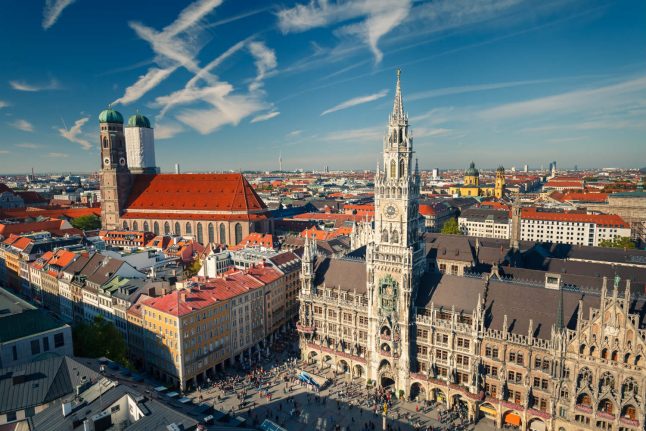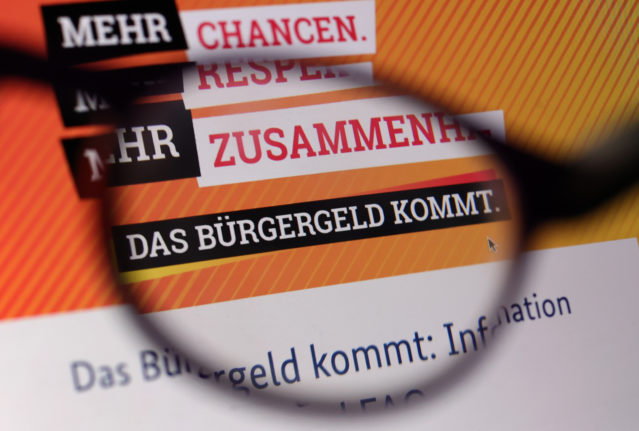While Germans and expats alike may complain of Munich’s ever-increasing prices, a good job market and higher-than-average German wages mean that the Bavarian capital remains an attractive city.
The proximity to Alpine vacation bliss can’t hurt either. And the rest of the world agrees: in 2019, Munich tied for third in Mercer’s “Quality of Living” rankings.
SEE ALSO: Three German cities ranked in the top 10 of the best places to live
Munich residents boast about safety, too. Spanish blogger Elena from My Adventures in Munich, an expat blog, marvels that even her bike is safe in Munich: “You can park it outside the supermarket while you shop and even leave your stuff in the basket. All will still be in the basket when you come back,” she says.
Housing, bills and insurance
There is no way to get around it: housing in Munich is incredibly expensive, as the Statista graph below shows. The cost of buying an apartment in 2018 is an astronomical €8,340 per-square-meter; Meanwhile, a new renter could easily pay upwards of €20 per square foot.
 Graph translated for The Local by Statista
Graph translated for The Local by Statista
Besides searching for odd deals on the usual sites, try Wohnungsboerse, where you can search apartment listings posted directly by landlords, which saves you money working through a middle-man.
You can also verify with this price check tool if you think your potential landlord might be charging higher than the 10% above the neighborhood average that the Mietpreisbremse law allows.
According to housing data gathered by Wonungsboerste, Munich’s most affordable district is Perlach, so you can try looking for deals in the inner neighborhoods of the borough, like Giesing. Allach-Untermenzing, Am Hart and Hadern also average under €17 per square meter, so try keeping your housing search within these lower(er) cost boroughs.
Even students are beset by high housing costs in the Bavarian capital. That said, WGs (shared flats) are definitely the way to live cheaply, and can be found on many websites and Facebook groups. Beyond that, students can use their status to get discounts on other city services, which is something you can take advantage if taking language courses.

Graph translated for The Local by Statista
Low-income individuals and families can also apply for a München-Pass, a free service through the Office of Housing and Migration, for discounts on city services (like transportation) and help finding social housing. This pass opens up an abundance of cost-saving options.
There is a difference in energy prices when choosing providers. Munich’s main electricity provider, Stadtwerke München, is the default option if you sign a lease in the city. But they are also the highest-cost energy provider. If you qualify for low-income rent, you can request Stadtwerke München for a free energy-saving kit for your home. Or, you can also switch to a cheaper provider, like E Wie Einfach.
Internet providers vary too, from the cheap and basic to fiber-optic cable for speedy, but more expensive service. Compare prices based on your usage and needs with Check24.de or another price comparison tool. Munich’s public libraries are another great place to get free WiFi.
Personal health insurance, a mandatory cost for all German residents, is a monthly expense that is usually non-negotiable. To help you navigate the options, we’ve created this handy guide. Keep in mind that some insurers offer discounts or rebates for participating in health-conscious activities, like using a gym membership or going to yoga.
SEE ALSO: The complete guide to how you can still live cheaply in Berlin
Getting around
Like elsewhere in the country, Munich’s city infrastructure supports cyclists with more than 1,200 kilometers of cycling lanes and city maps that direct cyclists to the most efficient routes.
It’s pretty easy to buy a bicycles at many new and used bike shops in the city, but you might get a better deal on Facebook groups or through shadier, friend-of-friend dealings.
Keeping in mind Munich’s reputation for low crime, we’ll assume your unknown used bike dealer’s for-sale bike is not stolen. Nonetheless, be sure to test the brakes and give the bike a mini drive before turning over any cash.
The Radlflohmarkt, an annual flea market just for bicycles, is coming up on April 13, so it may just be the perfect time to compare deals and find your wheels. Oh, and you should definitely buy a bike lock.
If you don’t spend that much consecutive time on a bike, it may be more affordable to rent a bicycle by the hour. Sign up for Next Bike and pay 1 euro per half hour to ride their bikes through the city, with a daily maximum of €9.
If you must ride public transport, weekly and monthly transit passes are organized by different fare zones. You could also use a bike-bahn combination to save on transport by biking into a nearer zone and purchasing a discount two-ring monthly pass for only €55.20 instead of the regular €79.10 for the standard four-rings.
 A tram in Munich. Photo: Depositphotos/Leonid_Andronov
A tram in Munich. Photo: Depositphotos/Leonid_Andronov
Groceries
Obviously, you’ll save money by cooking and eating at home rather than eating out. But where you shop is also important. Grocery stories like Lidl, Aldi, Penny or Netto are best for bargain-hunters. You can also take advantage of low-budget restaurants in student neighborhoods, too. In Maxvorstadt and Gärtnerplatz, the Studentenfutter goes beyond trail mix.
Beyond that, you can sign up for Foodsharing.de or be part of the “Fair Teiler” program at EineWeltHaus (Schwanthalerstr. 80), which leaves food in an unlocked fridge and allows people to take what they need and leave what they have, based purely on trust.
Clothes and furniture
It goes without saying that second-hand stores offer the goods when it comes to shopping. Think outside the city centre, like Schwabing and Glockenbachviertel, to find the best deals.
Munich’s waste management company offers an online directory of second-hand shops and other ways to save money and combat waste. Check out the gift-and-swap portals or the freecycle-style neighborhood site Swop, which also offers the free sharing of used goods.
Flea markets, like the Gebrauchtwarenkaufhaus are great for buying or selling furniture and larger goods. Plus, flea market finds spare you the embarrassment and confusion of walking into someone’s house and finding their Ikea living room is an exact replica of yours.
Language-learning and leisure
For picking up some German, the Münchner Volkshochschule is both economical and practical. Their courses cover A1 to C1 students, including a special prep course for C1 certification. “Their language trainers are old school,” says Elena. “They would probably not befriend you in Facebook, but they will make you learn German.”
A great place to stock up on culture for free is the library. Besides for all of the great books (in many languages) available, they often host free cultural events. Gasteig Kulturzentrum and KulturRaum München both have extensive free programming throughout the year, including dance, music, theatre and cinema events. And in the summer, August’s Theatron festival in Olympiapark is a is a full-on free open air music festival.
Don’t forget that on Sundays, most of Munich’s museums offer free or one-euro entry, and on Mondays and Tuesdays, many cinemas offer discount seats.
For more ideas, check out the city’s own helpful advice guide, “Cheaper Living in Munich.”




 Please whitelist us to continue reading.
Please whitelist us to continue reading.
Member comments